Marcy Marchello
Massachusetts Department of Conservation and Recreation (DCR)
Universal Access Program
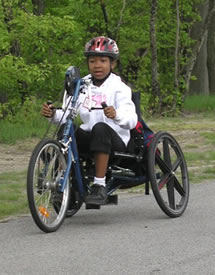 Don't let physical limitations stop you from enjoying a bike ride! Many well-established bike designs on the market reach beyond the typical concept of the traditional upright two-wheeled bicycle. Adaptive bikes often sport three wheels and offer people with a wide variety of disabilities greater stability and function as they access bike paths, trails, and roads. Don't let physical limitations stop you from enjoying a bike ride! Many well-established bike designs on the market reach beyond the typical concept of the traditional upright two-wheeled bicycle. Adaptive bikes often sport three wheels and offer people with a wide variety of disabilities greater stability and function as they access bike paths, trails, and roads.
People using wheelchairs with good upper body strength most commonly use hand cycles - hand and arm powered tricycles which come in either upright touring models or sleek, low riding performance bikes. For people who cannot use their legs to propel themselves, these bikes are a wonderful way to get out of a wheelchair and experience the exercise benefits of cycling.
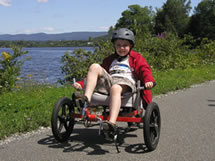 Those with mobility impairments, who are able to pedal with their legs, benefit from recumbent trikes for easier balance. Various designs accommodate people in an upright seated position or a more recumbent mode, with hand controls at thigh height or raised to a conventional handle bar level. A footpedaled adult sized trike is all someone needs for an independent ride, but a recumbent three-wheeler will be far more comfortable. Those with mobility impairments, who are able to pedal with their legs, benefit from recumbent trikes for easier balance. Various designs accommodate people in an upright seated position or a more recumbent mode, with hand controls at thigh height or raised to a conventional handle bar level. A footpedaled adult sized trike is all someone needs for an independent ride, but a recumbent three-wheeler will be far more comfortable.
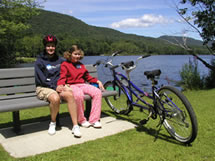
Tandems offer the support of a companion for balance and navigation. People who are blind and ambulatory can bicycle on a conventional tandem bike with a sighted driver. Three wheeled tandems ease the challenge of balance for both riders, especially when cognitive ability or coordination limitations are factors. A well designed bike will put the rider with the disability up front with added supports such as ankle or chest harnesses and steer from the rear.
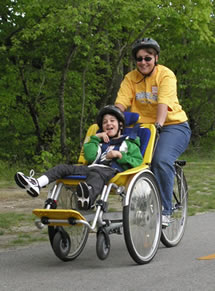 Anyone who is unable to actively use their body can also enjoy the cycling experience on a wheelchair tandem, another three-wheeled bike in which the front rider is passive, with chest and head support if needed, and the rear rider drives the bike. Anyone who is unable to actively use their body can also enjoy the cycling experience on a wheelchair tandem, another three-wheeled bike in which the front rider is passive, with chest and head support if needed, and the rear rider drives the bike.
Currently, the DCR Universal Access Program provides adaptive bicycles at adaptive cycling programs on both the Norwottuck and Ashuwillticook Rail Trails in Massachusetts. Adaptive cycling programs provide not only bikes, but instruction, assistance, and ride support as needed. Hand cycles can be rented for use on the Cape Cod Rail Trail and the Norwottuck Rail Trail. Adaptive bike demonstrations can be a vital addition to cycling related events or programs in other parks. For further information, contact Marcy Marchello at 413-545-5758 or marcy.marchello@state.ma.us or visit http://www.mass.gov/dcr/universal_access/
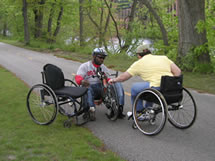
You can investigate a variety of adaptive bicycles via the internet on the following websites:
www.bike-on.com
www.billdarbydesign.com
www.frankmobility.com
www.freedom concepts.com
www.haverich.com
www.intrepidequipment.com/
www.berkelbike.co.uk/more_than_a_handbike
http://www.rifton.com/products/mobility/adaptivetricycles/
Pictures were taken by Marcy Marchello, DCR Universal Access Program, on the Blackstone Bike Path in RI and the Ashuwillticook Rail Trail in Cheshire, MA.
|
